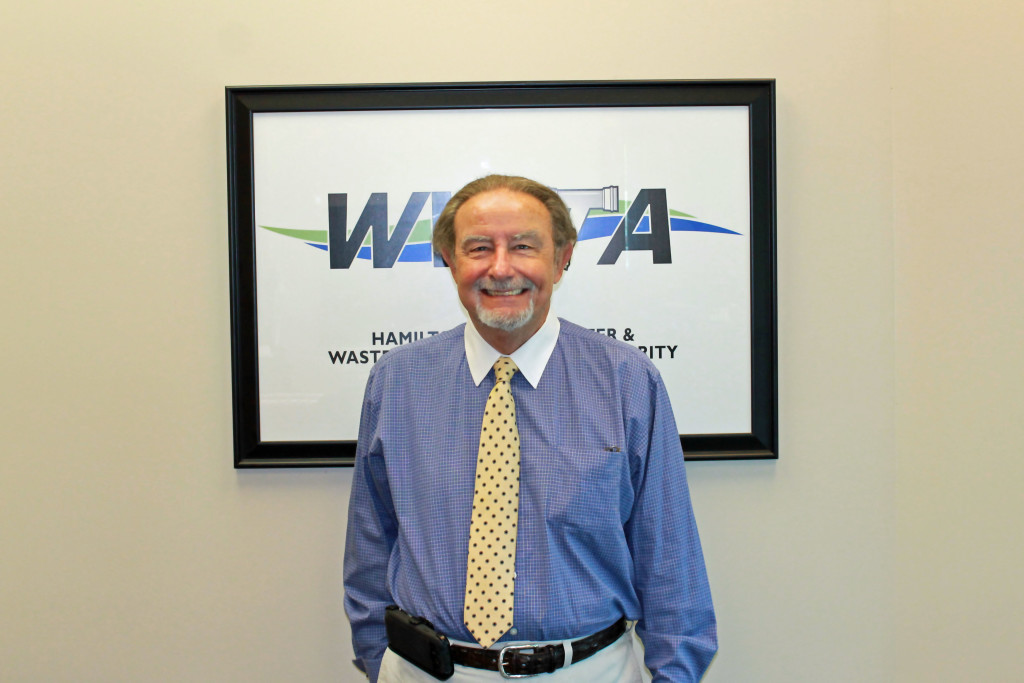The Hamilton County Water & Wastewater Treatment Authority has something of an image problem in East Ridge. Don Seagle wants to help change the perception that citizens have of the WWTA into something more positive.
Seagle, 65, has been East Ridge’s representative or commissioner on the WWTA since March 2011 when he replaced Tom Card. One look at Seagle’s long career gives one the impression that Mayor Brent Lambert picked a qualified man for the post.
Seagle rose to the position of Manager of Manufacturing for Burkart-Schier Chemical Co., where he was responsible for more than 100 employees. When General Aniline & Film Corporation bought out the business, he was tabbed as the man to expand production in Northeast markets. Unfavorable market conditions in the petroleum industry brought him back to Dalton, Ga., where he accepted a position as regional sales manager for his old company, Burkart-Schier.
He became plant/sales manager of Colox Corp. (Burkart-Schier’s name changed) in Ringgold. In August of 1993, American Cyanamid Co. called on Seagle. He went with them and stayed until he took early retirement in 2001.
He then founded his own business, Water Environmental Consultants, a business which services water treatment customers such as Chattanooga, Nashville, Knoxville and Memphis. WEC provides technical expertise to help cities and businesses maximize drinking water/wastewater plant performance.
Seagle sat down with East Ridge News Online recently to talk about challenges facing the city in terms of its sewer system as it embarks on potentially unprecedented economic development.
“My dream is in five years to see Exit 1 improved under the Border Region Act,” Seagle said. “We’ve got to control infiltration of rainwater into the sewer systems. (Infiltration) overwhelms everything.”
Seagle explained that sewers in the eastern part of East Ridge, which comprises what’s known as Area 10, have overflowed five times during heavy downpours. The rainwater seeps into lateral lines of many of the 13,000-plus connections that East Ridge has to the WWTA’s sewers. The system cannot handle the volume of water and sewage mixed with rain water that in his words “overwhelms” the treatment system.
Seagle said that EPA and the Tennessee Department of Environment and Conservation (TDEC) took note of the “rain events” and wanted something done. The environmental regulators imposed what is called a “voluntary moratorium” on Area 10.
The term “voluntary moratorium” has nothing to do with banning new connections to sewers, Seagle said. He said it merely meant that EPA/TDEC would not impose a fine on the city for these sewer overflows with the provision that the situation be addressed.
Seagle said WWTA representatives told regulators that they could do nothing about the rain. He said the regulators response was, “OK, if you can’t stop the rain, what can you do?”
What is currently being done, Seagle said, is “smoke testing” lateral lines that come from residences and businesses that flow into the sewer system. Smoke is forced into those lines. If it comes out the vent stack on the roof and not along the lateral lines buried in the ground, it’s good. If not, the lateral lines need to be replaced. Keeping the lateral lines from being infiltrated by rainwater helps prevent overflows in the sewers, and leads to at least a partial solution.
The results of these “smoke tests” will be included in a WWTA document to the EPA called a Management, Operations, and Maintenance (MOM) report, Seagle said.
Seagle said that the principals from Wolftever Development recently attended a WWTA Board meeting at the county’s Development Resource Center in Chattanooga.
“They presented some maps and photos of the Bristol area and what’s been completed up there in two years,” he said. “They wanted to get on our radar.”
Seagle said John Healy and Ethan and Matt Wood provided the board with drawings, maps and pictures of what Jordan Crossing will look like once it is built out.
“They want us to know they would like us to work with them,” Seagle said of the Wolftever presentation to the WWTA.
Mayor Lambert said he and other city officials recently met with WWTA officials and Hamilton County Mayor Jim Coppinger to talk about the challenges facing East Ridge and its sewer system.
“It was a good conversation,” Mayor Lambert said. “We know we have sewer issues and in order to rectify them we need guidance. We want to identify where we have problems with lateral lines and replace them.
“We all understand with the development we have in the city we need to foster good working relationships and be pulling in the same direction,” he said.

